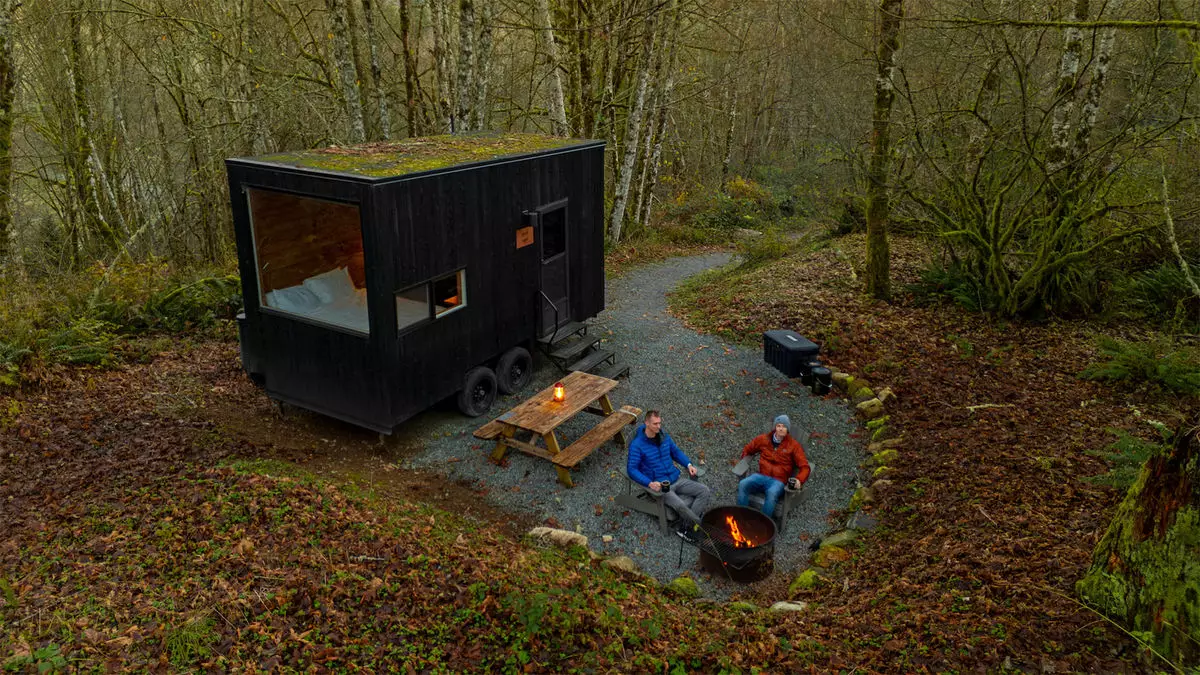The hospitality industry is undergoing a significant transformation as major players venture into outdoor accommodations to meet a growing demand for nature-oriented experiences. Recently, Marriott International, one of the largest hotel chains globally, has taken a noteworthy step by acquiring Postcard Cabins. This acquisition is paired with a long-term partnership with Trailborn, an emerging boutique hotel brand focused on nature enthusiasts. These developments indicate Marriott’s commitment to creating an upscale collection catering to travelers who crave immersive interactions with the natural world.
Postcard Cabins, founded in 2015 and formerly known as Getaway, specializes in minimalistic yet cozy “tiny cabin” stays within a short drive from major U.S. cities, boasting an inventory of over 1,200 cabins across 29 locations. Whether in the serene Catskills, the picturesque Shenandoah Valley, or in Running Springs, California, these cabins provide a unique blend of comfort and closeness to nature. By incorporating such offerings, Marriott is redefining what it means to experience outdoor hospitality at upscale standards.
Marriott’s strategic moves are not isolated; other significant hospitality players are also keen on tapping into the outdoor accommodation trend. In the past year, Hyatt Hotels forged a partnership with Under Canvas, allowing their loyalty program to include glamping resorts. Similarly, Hilton’s collaboration with AutoCamp aims to bring unique outdoor experiences to its clientele through offerings like luxury tents and custom-designed Airstream suites.
This category has seen a rapid influx of new entrants, including Outbound Hotels, Loge Camps, and Field & Stream Lodge Co. Each brand seeks to find a niche that sits comfortably between basic lodging and luxury lodges near national parks and recreational areas. With the likes of outdoor hospitality gaining momentum, many industry experts anticipate a sustained growth trajectory for this segment.
The increasing interest in outdoor hospitality signifies a shift in travelers’ preferences towards nature-based adventures. According to Shannon Stowell, CEO of the Adventure Travel Trade Association, Marriott’s acquisition of Postcard Cabins illustrates a broader evolution in how adventure is defined. The ATTA’s 2024 Adventure Travel Industry Snapshot underscores that popular outdoor activities are diversifying. Hiking and culinary experiences have gained traction, reflecting a growing appetite for “soft adventure.” This term captures activities that involve exploration and nature but aren’t limited to extreme challenges.
Such trends are fueled by an aging demographic of outdoor enthusiasts looking for accessible activities, as well as multigenerational families keen on collaborative adventures that accommodate varying comfort levels among participants. The contemporary adventure seeker might find joy in a day spent hiking, followed by a relaxing wine tasting, and capped off with a luxurious hotel stay—all of which signifies a new definition of adventure travel.
The luxury adventure travel sector is also adapting to these changes. Luxury travel brand Pelorus has recognized the need to broaden its appeal beyond “extreme” adventures, incorporating more “soft adventures” that accommodate families and varied interests. Pelorus has rolled out offerings like a Family Winter Adventure in Scandinavia, combining luxury lodging with engaging activities such as snowmobiling or dogsledding. These experiences illustrate how the concept of adventure is not confined to physical challenges, but now includes enriching, family-friendly activities.
This pivot highlights a growing trend: the rise in family-oriented travel experiences, with Pelorus recording significant growth in family bookings. Their introduction of the ‘Pelorus Junior’ program specifically caters to younger adventurers, allowing for parallel itineraries that engage children while parents indulge in adult-centered experiences. These changes display a keen understanding of the evolving desires of modern travelers who wish to create shared memories amidst the backdrop of nature.
The hospitality industry’s pivot towards outdoor accommodations encapsulates a cultural shift where many travelers prioritize experiences that connect them to nature. According to David Kolner, of Virtuoso, an increasing number of travelers are seeking outdoor adventures that spark a sense of wonder, with many expressing desires for rejuvenation and personal growth through these experiences. The industry’s response indicates a forward-thinking approach to development in hospitality that marries comfort and nature.
As the competition intensifies among established hotel brands to innovate within this space, it becomes clear that the future of hospitality is increasingly interwoven with outdoor adventure. By meeting the demand for luxurious yet authentic experiences, these brands not only enhance the traveler’s connection with nature but also set new benchmarks in the hospitality landscape. Ultimately, this evolution may well lead to a richer, more fulfilling travel experience for generations to come.


Leave a Reply